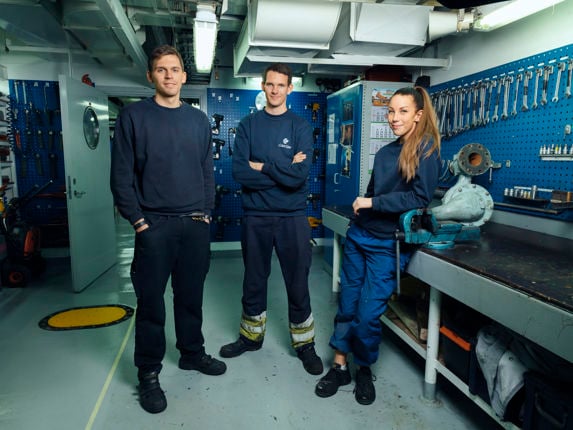The maritime industry needs more bright minds
The Norwegian maritime industry has a strong international position and is a leader within technology and development. At the same time, the industry needs more bright minds, both on land and at sea, in the years to come.

Employees onboard "Color Magic", which operates in regular traffic between Oslo and Kiel. Photo: Arild Danielsen/Color Line AS
New green solutions and increased digitalization on ships place new and high demands on maritime expertise. Both seafarers who man the ships and those working on shore must, to a greater degree than before, update and further developed their expertise during their careers.
“The cooperation between academia, the authorities and the industry will be even more important to keep up with the rapid changes,” says Karin Gjerløw Høidahl, Section Leader for Competence, Recruitment and Education at the Norwegian Shipowners’ Association.
Maritime academies must have updated equipment and expertise to give employees of the future the skills they need when starting jobs in high-tech workplaces both at sea and on land.
Maritime Career
More young people must be recruited to the maritime industry to meet the future need for expertise. The Maritime Career campaign is a collaboration between the Norwegian Shipowner’s Association and Maritimt Forum and aims to increase knowledge about the industry among young people. The Norwegian Maritime Competence Foundation is funding the campaign.
“Through Maritime Career, we want to showcase our industry as both relevant and attractive to young people entering working life. We give the maritime industry a public face through young people working in the industry sharing their experience from everyday life on social media.” says Høidahl.
Digital competence is becoming more important
Because of the technological developments in the maritime sector, the need for digital competence in combination with operational experience from sea and land will increase in the years ahead. What is learned through education is no longer sufficient to maintain relevant competence throughout an entire working life. Around 80 percent of ship owners state in the member survey that ICT and digital competence, together with operational experience from sea, will be the most important types of expertise to attract in the coming decade. These are also the same types of expertise that ship owners believe it will be difficult to obtain in the next 10 years.
“Digitalization is now changing how shipping is operated and developed, and this affects seafarers. The industry believes it is entirely possible to provide today’s seafarers with the necessary digital skills. As long as we get the educational opportunities, we are highly motivated to continually update and develop our skills,” says Hans Sande, Managing Director of the Norwegian Maritime Officers’ Association.
Synnøve Seglem, Deputy Chief Executive Officer at Knutsen and President of the Norwegian Shipowners’ Association, confirms that digital competence is becoming more important.
“New, high-tech ships demand new knowledge from the people that will operate them. Today, there is so much data intelligence and aids onboard that must be understood, and that the user must not least know the limitations of. If something goes wrong, the consequences can be huge,” she says.
“Data analysis onshore is becoming increasingly important” Seglem continues. She says it is currently difficult to get hold of people, particularly in the fields of data analysis and cybersecurity.
“We see that more and more is being invested by shipping companies in digitalization and optimization of operations,” says Høidahl. These are important measures to further develop the industry, but also place new demands on the competence of employees.
Shortage of skills and manpower
A lack of competence is an increasing challenge for the industry, and a report from Menon shows that the challenge has been intensified by the corona crisis, demographic changes and high demand for labour in Norway.
“We see that there is a great demand for competence and manpower in the maritime industry. This is one of the biggest barriers to further growth for companies,” says Høidahl.
The maritime industry has a ‘reverse apprenticeship problem’. Where the Norwegian industry usually has not had enough apprenticeship positions, the maritime industry is crying out for more candidates. About 40 percent of shipping companies report that the need for apprentices will increase over the next five years, and 38 percent report they believe the need for cadets will increase over the next five years. Compared with last year’s survey, this is a significant increase of 13 percent and 20 percent, respectively.
More people need further education and ongoing training
Competence enhancement through further education and ongoing training will be one of the most important factors to secure the right expertise for the maritime industry in the years ahead. The industry and the authorities must cooperate on adapting the further education system to the working life of tomorrow. It must be easy for those in work to take courses and further education during their working life.
“Educational institutions must provide maritime education of the highest quality in line with the competence need of the future. Not only basic education for tomorrow’s seafarers, but also for the many Norwegian seafarers who find new and exciting opportunities on land every year. Their knowledge and experience are crucial for the industry’s ability to innovate,” says Sande.
69 percent of shipping companies state that they experience an increasing need for further education and ongoing training.
To meet future competence needs, competence enhancement and further education are necessary throughout the company, including at senior management level. In order to make good decisions and lead companies through major change processes, leaders must update their competence in the face of a new and more digital everyday life, says Høidahl.